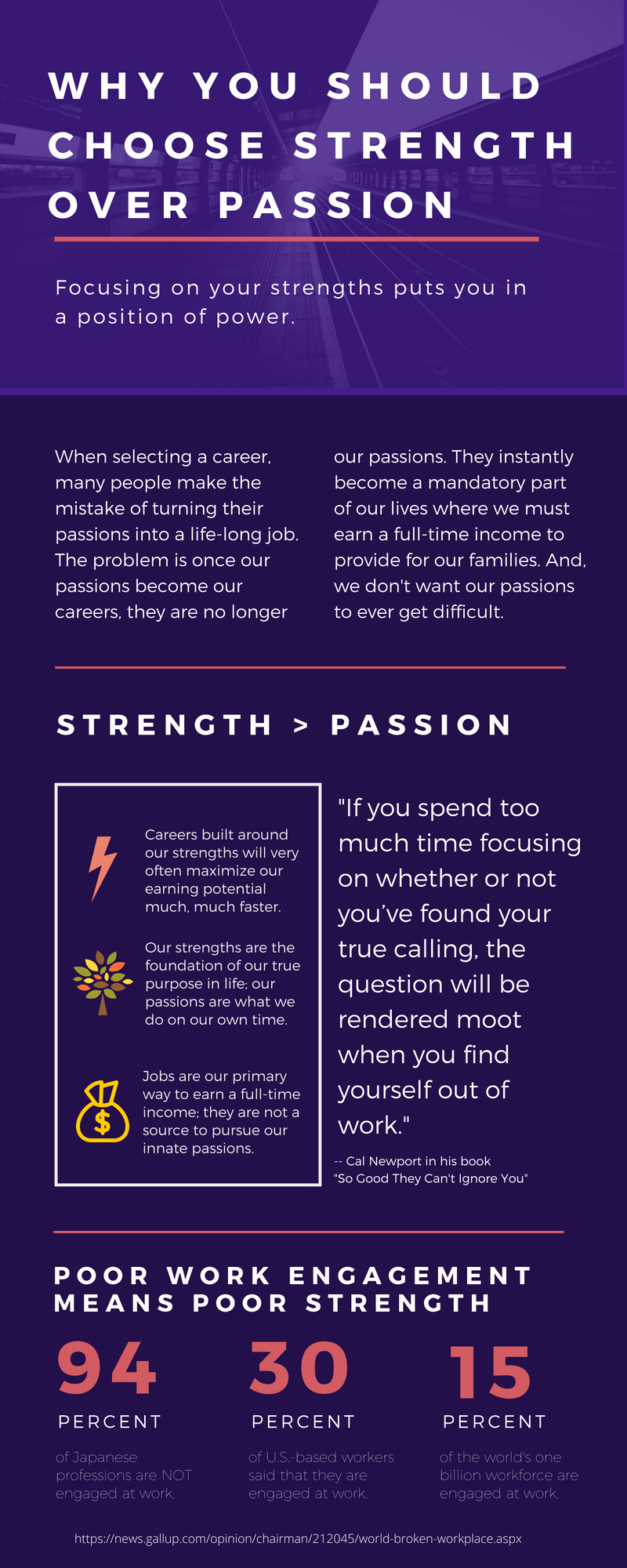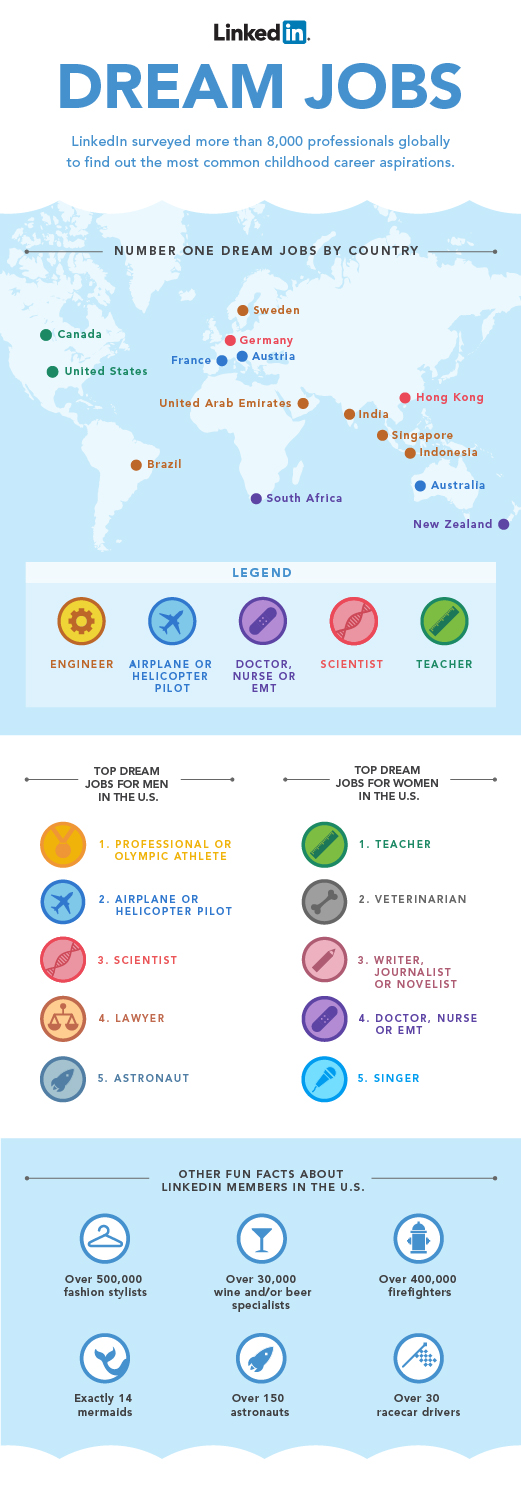Hey society? Please stop telling people to "follow your passion"
I am a firm believer that "follow your passion" takes a back seat to follow your strengths. Strengths are what make us money; passions are kept separate.

If I were doing today what I was enthusiastically giddy about as a child, I'd probably be a photographer right now, and hopefully, employed by some sort of media organization. Or something.
But, I can safely say that I wouldn't be retired early.
Like degrees, I am a firm believer that following our so-called passions take a back seat to following our strengths. What we're good at and what we're passionate about are two very, very different things.
In Cal Newport's ingenious book "So Good They Can't Ignore You: Why Skills Trump Passion in the Quest for Work You Love", (<-- affiliate link!) he explains why passion generally comes after putting in long and hard work producing something of value - not before it.
"Compelling careers often have complex origins that reject the simple idea that all you have to do is follow your passion," Newport writes.
He then attacks "passion" with, well, passion!
"Whereas the craftsman mindset focuses on what you can offer the world, the passion mindset focuses instead on what the world can offer you. This mindset is how most people approach their working lives.
"There are two reasons why I dislike the passion mindset (that is, two reasons beyond the fact that, as I argued in Rule #1, it’s based on a false premise). First, when you focus only on what your work offers you, it makes you
hyper-aware of what you don’t like about it, leading to chronic unhappiness.This is especially true for entry-level positions, which, by definition, are not going to be filled with challenging projects and autonomy—these come later. When you enter the working world with the passion mindset, the annoying tasks you’re assigned or the frustrations of corporate bureaucracy can become too much to handle.
"Second, and more serious, the deep questions driving the passion mindset—“Who am I?” and “What do I truly love?”—are essentially impossible to confirm. “Is this who I really am?” and “Do I love this?” rarely reduce to clear yes-or-no responses.
In other words, the passion mindset is almost guaranteed to keep you perpetually unhappy and confused, which probably explains why Bronson admits, not long into his career-seeker epic What Should I Do With My Life? that “the one feeling everyone in this book has experienced is of missing out on life.”
Cal Newport in So Good They Can't Ignore You
The problem with making your passion your job
When you turn your passion into a job, your job is no longer your passion - at least for a lot of us.

After all, your mind tells you that you're supposed to love the work - and why not? It's your passion!. But, jobs aren't always like that. Companies don't care about your passion. They care about your strengths. Your production. And, your ability to dependably get your job done.
Passion or otherwise. They don't care.
Or if you "work for yourself", you're tasked with turning your passion into a means to provide for your livelihood. Always on the hunt for new clients. New customers. Your passion becomes a mechanism to put food on the table and provide for your family.
Pardon me, but that doesn't sound like passion. That sounds like a job.
Apparently, Dallas Mavericks owner and super-rich businessman Mark Cuban agrees, saying "One of the great lies of life is 'follow your passions,'" in an Amazon Insights for Entrepreneurs video. "When you look at where you put in your time, where you put in your effort, that tends to be the things that you are good at."
Cuban continued: "If you put in enough time, and you get really good, I will give you a little secret: Nobody quits anything they are good at because it is fun to be good. It is fun to be one of the best."
When I was younger, my passion was sports. I loved playing football, baseball, and basketball - generally with the other neighborhood kids during that particular season. But, let's face it: I prooooooobably wasn't going to become a professional baseball player. Or an NFL wideout.
"Follow your passion" is bad advice for two primary reasons.
Why "follow your passion" is risky
Passions don't always pay the bills
Have you ever heard the phrase "Go after your dreams and the money will follow!"? It's a lovely phrase to think about. Believe, even. But, your passion might not always pay the bills. Sometimes, it never will.
When extremely successful people tell us to follow our passion, we immediately assume that if we do, we'll wind up like them. So, if our passion was writing, then we should write and probably wind up like Stephen King. Or J.K. Rowling. Though it can happen, it takes a lot of work. Lots of persistence. Lots and lots of tenacity.
But, here's the problem: For most of us, passions are easy, not hard. They come naturally to us. Though they might require varying degrees of effort to pursue, we generally aren't stressed out by them. They aren't difficult in the same way that most of our jobs are. We smile while pursuing our passions because our livelihoods don't depend on them. It doesn't matter whether they bring in a full-time income. Or hell, any income.
We do those things freely and willingly because we enjoy them, not because we have to. Not because we need to earn a living.
In the same vein, most of us are paid based on the difficulty of our jobs. If our jobs are easy, we aren't paid as much as we would if our jobs are tough. Mentally tough. Janitors are paid less than software developers. Photographers are paid less than corporate executives. Most authors and artists don't enjoy the luxury of dependable bi-weekly paychecks.
"Choose a job you love and you’ll never work a day in your life!"
I could easily write this another way:
"Follow your passion and that passion will no longer be your passion."
Passions change over time
Here's the deal with passions: They change. There's no way that pursuing things (professionally) that I enjoyed when I was a teenager would have worked out for me. Why? Because I don't have the same zeal that I once had for those things and, frankly, sometimes hobbies are best left as hobbies.
Our hobbies and passions as young people probably won't look much like those hobbies and passions as older people. Perhaps it's wiser if we don't choose to base our entire adult careers on passions we felt while young - leading a different life.
While it's true that I still enjoy photography very much, I would put good money on the assumption that I still enjoy photography because I didn't pursue that passion.
I kept it as my hobby.
I chose to go into computers as a career. Strangely enough, I wanted nothing to do with computers as a youngster. I recognized a general aptitude for those things, but it seemed unfulfilling and extremely boring if I was sitting in front of a desk - all day, every day, doing computer stuff. No thank you.
Of course, I ended up graduating with a degree in information technology and doing exactly that - working with computers. Why? A computer career was highly marketable, and it paid extremely well and afforded me options that I may not have had.
For example, it afforded me the opportunity to save a bunch of money and retire early to travel the country in a 30' Airstream.

Bonus: Don't put your passion at risk by turning it into a job
Let's face it: For most of us, turning our passion into our one and only means to provide for our family means that it's probably no longer our passion. It's our job.
Like I said before, my passion is photography - but, if I were forced to photograph weddings, graduations or anything else simply because that was my way of making money, I probably would no longer take my camera out on the weekend to capture the world around us. If I did that for a living, the job would probably suck the passion right out of me.
I would have way less motivation to embrace what made photography one of my primary hobbies to begin with. I love being in control with snapping photos. I photograph what I want when I want. And, I'm not afraid to show anyone who will look, either. And if I don't feel like taking the camera with me, I leave it home.
Here, look at this:

And this:

I've kept my passions safe and separate from the mental and psychological torture of jobs, and that's precisely why I still love my camera.
Don't "follow your passion"; Choose strength over passion for your job
I believe it's important to resist the natural emotional pull to make your passion your job and instead rely on a much more practical means to earn a living, and there are several reasons why I believe this.
Focusing on your strengths puts you in a position of power. Like Mark Cuban said, most of us love doing the things that we are naturally good at. We have fun. We love winning, and it's more than just a little bit satisfying to know that our innate strengths are bringing home the bacon.
And when our livelihoods are at stake, it's wise to choose a career path that we are skilled in. It makes earning money easier.
Earning a living is your #1 priority. There is not much more that needs to be said with this one. Your job is a means to earn a living...to make money and provide for your family. Your job's purpose is to keep you alive and well, active and healthy. The more money that we make (within reason!), the more resources we have at our disposal to pursue our hobbies (passions!), not to mention save for our eventual retirements. Jobs aren't about passions.
Your job is your way of making a living - period.
"Wait, Steve," you might say. "You're telling me that jobs are all about money? The almighty dollar?"
Yes, that's exactly what I'm telling you. It's a "JOB" for a reason. They aren't here to spark passions inside you. Or make you the happiest little worker in the history of the world. Sorry, that's not how it works.
Jobs are our way of earning money to provide for our families, fund our hobbies and save for retirement. The sooner that we accept that fact, the quicker we accumulate enough to quit those jobs to pursue our passions much more fully.
The sooner we achieve "fuck you" (FU) money, the sooner we can [metaphorically] utter those words. I never advise actually tearing out of your office in an obscenity-laced rage, but the sooner that we accumulate enough money to have options (FU money), the sooner we can begin to explore other things that we might enjoy more heavily (you guessed it, this includes our passions). This is what we call our accumulation phase.
And the quicker that we get through that accumulation phase, the quicker we can get on with our lives...and our passions.
And for most of us, our passions probably don't pay as much as more practical money-making jobs - because we think of our passions differently. We believe our passions should bring us happiness without struggle. But, life doesn't work that way. At least, not for most of us.
Regardless of what you choose to do, the key is to think of your job as your JOB. Your primary money-factory.
Okay, so I should get a job I hate just to make money? Oh, come on, Steve! No way!
Of course not, and this is the most common criticism of those who argue against the whole passion thing. None of us argue that you should spend your life doing something that you hate for the sake of the almighty dollar.
That's not what this is about. I think that we can all agree that life is much too short to spend decades working in a field that you despise.
On the other hand, life tends to be much more enjoyable when we pursue things that we're both good at and are marketable. We make more money. We give ourselves way more options. If our goal is to retire early so we can pursue our passions without the need to earn a full-time income, we are more likely to do that if we understand that our job isn't about our passion.
There is a time and a place for our passions. Our jobs aren't it.
Our jobs are money-making devices. The more marketable our skills, the easier most of us will find (and keep) jobs. The better we are at performing our job duties (aka our strengths), the happier we will be doing those jobs.
And, the more likely we are to achieve a level of financial independence necessary to enable a full-on pursuit of our passions...without any worry about where our next meal is coming from.
As Cal Newport wrote, "If you spend too much time focusing on whether or not you’ve found your true calling, the question will be rendered moot when you find yourself out of work.".
Dream big, but think practical.
